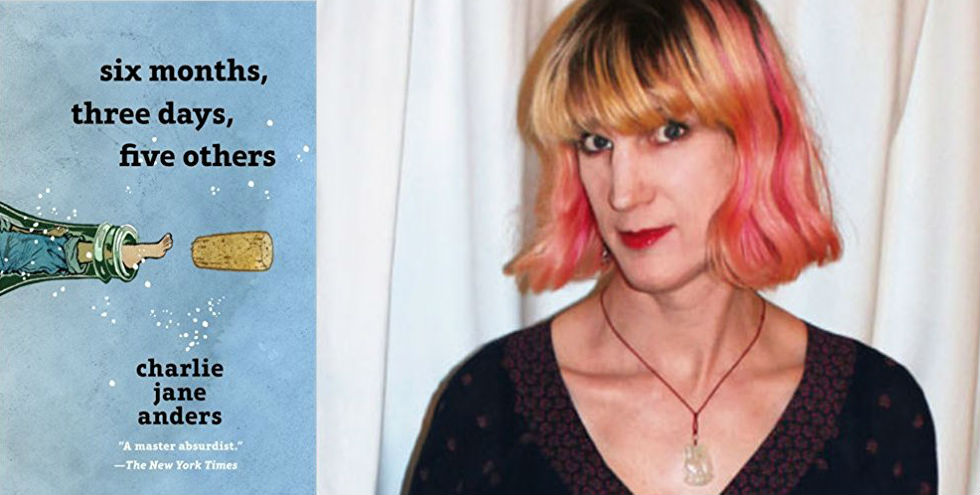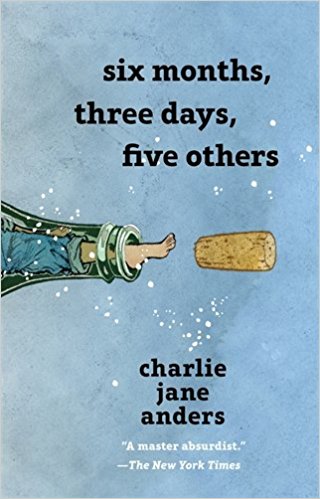Book Review: Six Months, Three Days, Five Others by Charlie Jane Anders

As you’ve seen in our Best Books of 2017 post and heard on the podcast, Charlie Jane Anders wrote my favorite book I read last year, All the Birds in the Sky, so of course I had to read this short story collection as well. Anders has been writing short stories for years, and this is the first compilation that’s all her own. The six stories contained in this pocket sized tome were all originally published on Tor.com between 2010 and 2016, and the title story, “Six months, Three days,” won the Hugo Award for Best Novelette. Anders is truly a master absurdist, and in this collection, there’s always more than meets the eye in stories that take a fresh look at tropes and add layers of social commentary while focusing on individuals.
In the first story, “The Fermi Paradox Is Our Business Model,” which is also the oldest in the collection, aliens reveal the truth about how humans were created, with an unexpected twist. At the start of the story, I thought it would be a pretty straightforward alien narrative, but as in all the stories in this collection, there were layers to this one that weren’t immediately noticeable. Anders is able to make a statement about capitalism while at the same time keeping it light and fun with the banter and relationship of the two alien protagonists. She’s able to take some tropes here and use them to her advantage, which was fun to see. This story also sets the tone for the book, which is humorous, super weird, and unexpected.
Similarly, in “As Good as New,” Anders gives her take on two tropes: the three-wishes narrative and the apocalypse. This unique telling of a traditional three wishes story explores humanity in unexpected ways via a playwright, who is the sole survivor of the apocalypse, and the stories of a genie, who has seen the apocalypse many times. Instead of focusing on the world itself, Anders focuses on the playwright as an individual, giving us backstory and building a relatable character who just wants everything to go back to the way it was. I found this to be a fresh take, and again, the story is layered with thoughts on regret, dreams, and living life. Keep peeling back the layers on this one, and you’ll find gems every time.
“Intestate” also takes a trope – the mad scientist – and gives it a twist by telling the story from the scientist’s family’s point of view during a family reunion and by showing how his mad science affects his family. It’s easy to get caught up in the chaos of the reunion and family members fighting over bionic body parts; however, this story is a smart take on the patriarchy and how we all contribute in our own way, knowingly or not. It’s also pretty easy to miss what is perhaps the most disturbing aspect of this story, which is that the protagonist earned their father’s disapproval by participating in a project that led to atrocities of war. The reunion is so wonderfully weird, and Anders yet again hides dark social commentary under a layer of humor and absurdity.
In all of these stories, Anders explores the individual through the context of bigger tropes, and “The Cartography of Sudden Death” is no different. Anders uses time travel and gorgeous imagery to take us on a romp through brutal regimes and brushes with death through the eyes of the protagonist, who is a lowly servant to a grand “Beldame.” The servant accidentally runs into a time traveler during said Beldame’s funeral, and a swashbuckling adventure through time ensues. Peel back the layers here, and you’ll find statements on power structures, nihilism, and history. Anders makes us feel very small in a very large universe – messing with history doesn’t really matter when you’re a drop in the bucket.
“Six Months, Three Days” is the title story, and a story of the love affair between a man who can see the one true foreordained future, and a woman who can see all the possible futures. This story won the 2012 Hugo Award for Best Novelette, and it was my favorite story of the collection. What struck me about this story was how real it was, even while being quintessentially sci-fi. In real relationships (at least in the ones I’ve had), it seems there’s always one person who is optimistic about all the possibilities, while one person is certain things will turn out a certain way. The person who knows things will happen this way ends up manifesting that ending, when in reality, if they could just see it, they’d know that there are many paths to take. Again, Anders focuses on the individuals in this story to make a much more powerful statement that will stay with you long after you’ve read it.
And finally, “Clover,” exclusively written for this collection, is a coda to All the Birds in the Sky, answering the burning question of what happened to Patricia’s cat, which is something I’ve wondered since reading the book. It’s more lighthearted and warm, about a lucky cat and two men in a struggling relationship. I LOVE cats, so of course, a story told from a cat’s point of view appealed to me. And even though it does take place in the same universe as All the Birds in the Sky, it works well as a standalone story. Only Anders has the power to take a story about a cat and say something more about queer relationships, the world around us, and luck.
All the stories in this beautiful collection focus on individuals and inject absurdity into the mundane, but peel back the layers and you’ll find so much more than that. Anders uses weirdness and the big ideas of traditional sci-fi tropes as a backdrop for powerful social commentary on such subjects as power structures, dominance and dependence, patriarchy, relationships, and history. In every story, from aliens to genies to mad scientists and from time travelers to seers to cats, all of the characters know that life is hard, that life is utterly weird, and that if you just stick with it, maybe you’ll also be able to find the humor and absurdity in it all.
I highly recommend this short story collection. I like collections in general because you can easily pick them up, read a story, then put them down, and you don’t have to read the stories in order. This particular collection is an excellent way to introduce yourself to the work of Charlie Jane Anders. And in a gorgeous, pocket-sized, hardcover edition, it is excellent to carry around and to use as a conversation starter everywhere you go.
You can support us by ordering any of the books we mention on our blog, our podcast, or anywhere via our Place a Special Order form or by calling the store. We will even ship directly to your home. If you like our store and our content, the best way to show us is by buying something!
For more book discussions, book lists, and to see what our book clubs are reading, join our Goodreads discussion group.

